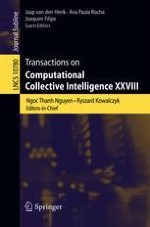2018 | OriginalPaper | Buchkapitel
Two-Stage Reinforcement Learning Algorithm for Quick Cooperation in Repeated Games
verfasst von : Wataru Fujita, Koichi Moriyama, Ken-ichi Fukui, Masayuki Numao
Erschienen in: Transactions on Computational Collective Intelligence XXVIII
Aktivieren Sie unsere intelligente Suche, um passende Fachinhalte oder Patente zu finden.
Wählen Sie Textabschnitte aus um mit Künstlicher Intelligenz passenden Patente zu finden. powered by
Markieren Sie Textabschnitte, um KI-gestützt weitere passende Inhalte zu finden. powered by
